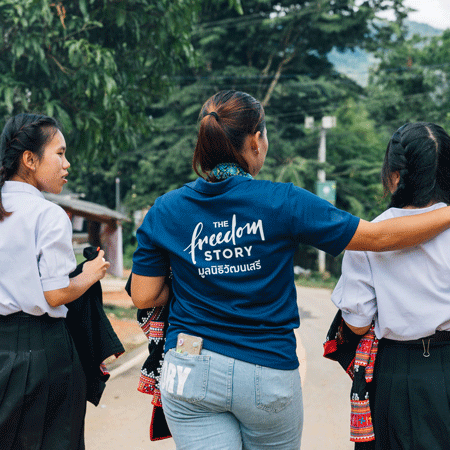
Segurança e bem-estar
Segurança e bem-estar
Enquanto muitos esforços para combater o tráfico humano se concentram em mulheres e meninas, uma organização na Tailândia concentra seus esforços antitráfico em homens e meninos. Fundada em 2015, Fundação Luz Urbana (UL) trabalha para proteger homens e meninos em Chiang Mai, Tailândia, do tráfico e da exploração, atendendo às suas necessidades básicas e capacitando-os por meio de educação, treinamento e aconselhamento para dar-lhes a liberdade de escolher uma vida além da exploração.
Os programas e atividades da UL se concentram em abordagens lideradas por jovens e por aqueles que foram traficados ou explorados. A fundação fornece serviços de saúde, treinamento de habilidades ocupacionais, workshops para proteção e prevenção, treinamento de habilidades para a vida, moradia, educação, extensão e suporte legal.

A UL concentra suas intervenções em homens e meninos devido à falta de cuidados e serviços sensíveis ao gênero no trabalho antitráfico para essa população. Os desafios recorrentes incluem a identificação de homens e meninos traficados, barreiras para acessar suporte, uma necessidade de educação e treinamento e uma necessidade de mais pesquisas e intervenções baseadas em evidências. Embora o principal grupo-alvo da UL seja homens e meninos, a fundação também trabalha com famílias, dependentes e responsáveis legais para fornecer serviços e suporte. A UL reconhece a importância de incluir as famílias e dependentes dos homens e meninos em seus programas.
A UL também defende a inclusão de outros membros da comunidade e estende serviços para famílias “escolhidas” ou “encontradas”. Muitos meninos e homens que foram traficados não têm uma família biológica segura e amorosa para recorrer, e a fundação acredita que trabalhar com os grupos com os quais eles sentem afinidade é uma forma de respeitar sua experiência e abordar a realidade de que famílias escolhidas, embora não relacionadas por sangue, têm o poder de ser uma influência positiva ou negativa em suas vidas.
Ao longo dos anos, a UL publicou vários relatórios de pesquisa para aumentar a conscientização sobre a falta de intervenções e cuidados para homens e meninos. último relatório, chamado “Tell Them What Happened to Me: An Exploration of Online and Offline Sexual Exploitation of Males and SOGIE-Diverse Young People in Northern Thailand” (Conte a eles o que aconteceu comigo: uma exploração da exploração sexual online e offline de homens e jovens com diversidade SOGIE no norte da Tailândia), foi publicado em 2022 em colaboração com a World Childhood Foundation. A pesquisa da UL mostrou que meninos, homens e membros da população LGBTQIA+ impactados pela exploração sexual querem que suas vozes sejam ouvidas.
Em 2023, a UL apresentou esta pesquisa no ECPAT Cimeira Internacional Global de Rapazes e o Conferência Antitráfico da Região da Ásia. A questão há muito esquecida do tráfico e exploração de homens e meninos foi destacada durante a apresentação. A pesquisa da UL gerou conversas sobre como trabalhar com homens e meninos, bem como incluí-los em intervenções e discussões antitráfico.

Muitas organizações antitráfico concentram seus programas em meninas e mulheres, e Maia Mounsher, Diretora de Estratégia e Gestão de Subsídios da UL, sugeriu uma maneira fácil para essas organizações começarem a incluir homens e meninos em suas intervenções: perguntar às mulheres e meninas que elas já conhecem: "Como está seu irmão?" Para organizações que já atendem algumas das mulheres e meninas em maior risco na Tailândia, por exemplo, essa pergunta simples pode ser uma maneira de aprender sobre homens e meninos que cresceram exatamente nas mesmas circunstâncias e provavelmente também correm maior risco de serem traficados.
A pesquisa da UL revela novas tendências e descobertas importantes. O uso da Internet para exploração sexual infantil e comércio sexual aumentou e se tornou mais difundido. A atividade online mais comum é enviar fotos ou vídeos explícitos para perpetradores. Normas e expectativas de gênero também apresentam vulnerabilidades únicas para homens e meninos. A maioria dos serviços sociais e apoio são fornecidos a mulheres cisgênero, e isso pode levar a sentimentos de estigma e exclusão para outros gêneros que são vítimas de exploração sexual. Um aumento nos cuidados e serviços sensíveis ao gênero é necessário para atender às necessidades de pessoas de todos os gêneros.
Além disso, a pesquisa mostra que fornecer oportunidades de emprego, moradia e educação pode reduzir a vulnerabilidade das pessoas e prevenir a exploração sexual. A falta de moradia, por exemplo, aumenta a vulnerabilidade à exploração sexual.
Em seu último relatório, a UL também fornece recomendações para provedores de serviços, governos, formuladores de políticas, pesquisadores e parceiros de financiamento. Uma das recomendações para parceiros de financiamento é fornecer financiamento flexível. O financiamento flexível e plurianual permite que os parceiros de base se adaptem às circunstâncias em mudança e dá tempo para a recuperação do trauma. Além disso, compromissos plurianuais de financiadores e financiamento flexível para moradia, educação e emprego alternativo podem criar mudanças sustentáveis e permitir que aqueles que vivenciaram o tráfico e grupos de risco se curem e cresçam. A GFC está comprometida com o financiamento flexível, o que permite que nossos parceiros determinem o melhor uso de seus recursos e lhes dá maior capacidade de inovar e se adaptar em resposta aos desafios enfrentados por crianças e jovens.
Foto do cabeçalho: Uma atividade de pintura oferecida pela Urban Light. © Urban Light
